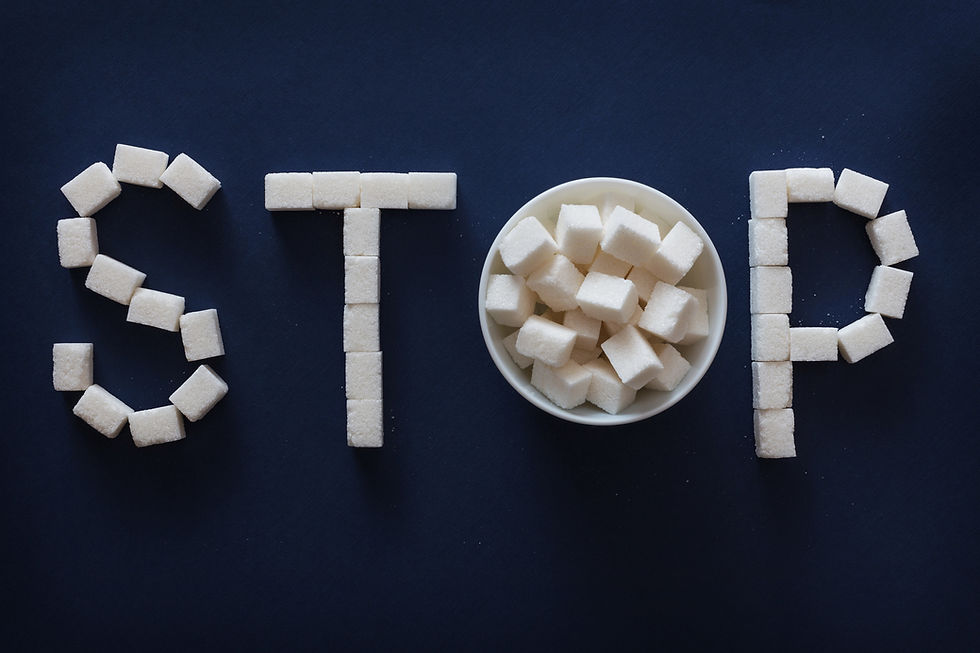Is Yakult Good for You: Exploring the Scientific Evidence
- Shruti Maheshwari

- Oct 3, 2024
- 4 min read
While my previous blog post explored the ingredient list of Yakult and its adverse effects on our bodies, the current one looks at the damaging scientific evidence. Yakult, the tiny probiotic drink loved by many, has positioned itself as a health drink for gut wellness. But is the iconic little bottle of Yakult really good for you, and how do its ingredients affect our gut microbiome? To uncover the truth about its health claims, let's explore the science behind Yakult, backed by cutting-edge research.

The Ingredients Breakdown
Red Bottle (Regular Yakult):
Ingredients: Water, Sugar, Skimmed milk powder, Glucose, LcS bacteria, Added flavors
Total Sugar: 10.5g
Added Sugar: 9.5g
Blue Bottle (Yakult Light):
Ingredients: Skimmed milk powder, Sugar, Glucose, Natural identical flavour, Water, LcS, Steviol Glycoside, Vitamin E, Vitamin D, Pectin
Total Sugar: 3g
Water: The Universal Base
Water is the primary ingredient in Yakult, serving as the base for dissolving all other components. While it is essential for hydration, water alone does not contribute to the probiotic benefits of Yakult.
Sugar and Glucose: The Sweet Dilemma
Yakult's regular version contains a significant amount of sugar. With 10.5g of total sugar, including 9.5g of added sugar, it's clear that Yakult is quite sweet. Excessive sugar intake has been linked to various health issues, including obesity, diabetes, and heart disease. This sugar content should raise a caution flag for those who are health-conscious and mindful of their sugar intake.
Fun Fact: Did you know that consuming just one bottle of regular Yakult provides about 2.5 teaspoons of sugar? According to the American Heart Association, that's over half the recommended daily intake of added sugars for everyone!
A study published in Nature Communications found that high sugar intake can disrupt the balance of gut bacteria, promoting harmful bacteria and reducing beneficial ones. This imbalance can lead to increased inflammation and metabolic disorders. A drink that positions itself as a probiotic is, in fact, disrupting your gut microbiome in the long run.
Are you wondering about the sugar-free version? I am coming to that.

Skimmed Milk Powder: The Dairy Dilemma
Skimmed milk powder in Yakult provides a medium for the probiotics to thrive. However, it lacks the nutritional benefits of whole or fermented milk products. Whole milk contains beneficial fats and fat-soluble vitamins that are stripped away during skimming.
Fun Fact: Whole milk can be more beneficial for your gut because it contains conjugated linoleic acid (CLA), which has been shown to have anti-inflammatory properties.
Like whole grain, whole milk is always the healthier dairy option.
Lactobacillus casei Shirota: The Probiotic Hero
LcS (Lactobacillus casei Shirota) is the star of Yakult, a strain of bacteria known for its gut health benefits. Research published in Frontiers in Microbiology shows that LcS can enhance gut microbiota composition, boost immune function, and improve digestive health.
However, Yakult's high sugar content counteracts these benefits. Sugar feeds harmful bacteria, ultimately reducing LcS's positive impact on the body.
Added Flavors and Preservatives: The Hidden Chemicals
Yakult contains added flavours and preservatives to enhance its taste and increase its shelf life. These flavours, which include citrus and Sodium Benzoate, might make the drink more palatable, but they are incredibly harmful to our health. Artificial additives tend to cause negative reactions in sensitive individuals and introduce unnecessary chemicals into the body.
Fun Fact: Artificial flavours can sometimes contain up to 100 different chemicals, including highly processed solvents and preservatives.
Steviol Glycoside: The Sweet Alternative
Steviol Glycoside is used as a sweetener in Yakult's blue, sugar-free bottle version. Because it is derived from the stevia plant, it's considered a natural alternative to sugar. However, a study in Cell Metabolism found that artificial sweeteners alter gut microbiota and increase insulin resistance. While blood sugar remains low due to the absence of glucose, your insulin still spikes because our bodies cannot differentiate between chemical sweeteners and natural sugar. Sugar-free sweeteners are never the "healthier" "alternative. I prefer regular sugar over chemical ones.

Pectin: The Thickener
Studies indicate that the impact of pectin on liver gene expression can be significant, affecting pathways related to lipid metabolism and inflammation. High levels of pectin also interfere with the absorption of certain nutrients. Pectin's gel-forming properties in the digestive tract can slow down food movement and affect the absorption rates of nutrients, potentially leading to deficiencies. Pectin, a natural thickener derived from plants, is another ingredient in the blue bottle version. While it is universally safe, daily consumption of additives like pectin can lead to digestive discomfort over time.
A study in the American Journal of Clinical Nutrition noted that while pectin can help manage cholesterol, excessive use can cause bloating and gas.
The Power of Natural Probiotics
Instead of relying on sugar-laden drinks, consider incorporating natural probiotics into your diet. Foods like yoghurt, kimchi, sauerkraut, kefir, and kanji are not only delicious but also highly effective in maintaining gut health.
Yogurt:
A study published in the American Journal of Clinical Nutrition found that consuming yoghurt with live cultures improved gut microbiota composition and reduced symptoms of lactose intolerance.
Kimchi and Sauerkraut:
Research in the Journal of Medicinal Food indicated that fermented vegetables like kimchi and sauerkraut contain various strains of beneficial bacteria that enhance gut health and boost the immune system.
Kefir:
A study in Frontiers in Microbiology demonstrated that kefir, a fermented milk drink, significantly increased gut microbiota diversity and exhibited anti-inflammatory properties.

Final Thoughts
While Yakult markets itself as a healthy drink, its high sugar content and artificial additives raise concerns. The probiotics in Yakult might offer some benefits, but the negative impact of its ingredients can outweigh these advantages. Opting for natural, homemade probiotic sources like yoghurt, kimchi, and kefir can provide more substantial health benefits without added sugars and artificial ingredients.


